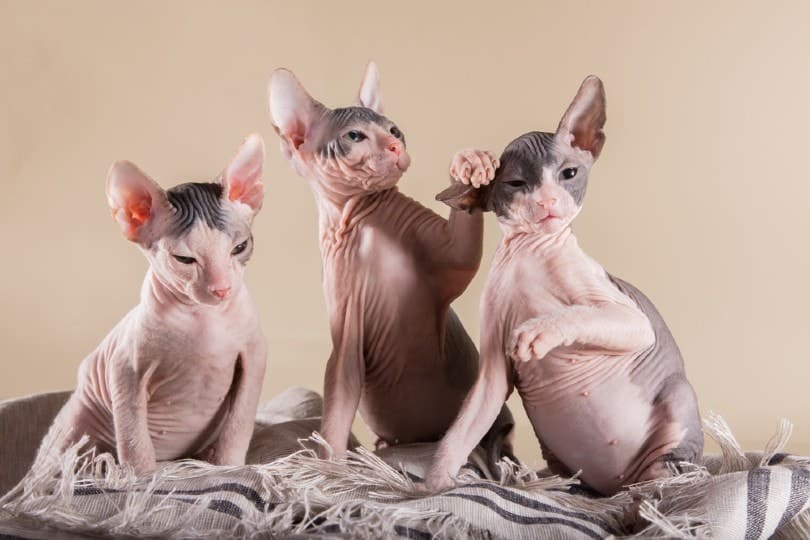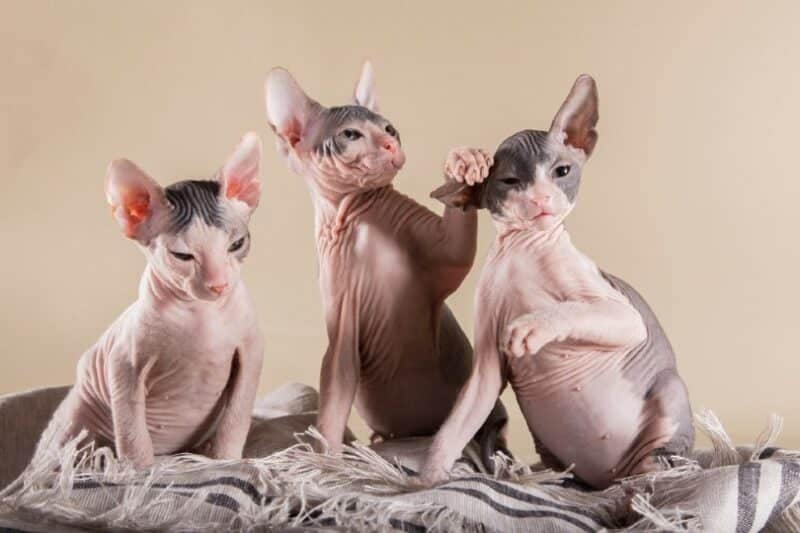Catster advocates for adopting before shopping, though we fully understand there are many reasons for seeking a breeder. So, we encourage it to be done the right way. We have not personally visited or investigated all of the breeders below. We have put the top-recommended all in one place for you to get in touch and make the best decision for you. Learn more about our stance and how to choose the right breeder here.
The Sphynx is a relatively modern hairless cat that wasn’t developed until the 1960s but has since steadily grown in popularity. Some people might be surprised by its appearance, but it’s an extremely friendly cat that loves to snuggle to get warm.
If you are thinking about getting one of these cats but aren’t sure where to find a breeder, keep reading while we help you answer that question and give you the tools you need to select the best breeder for your Sphynx kitten.

Sphynx Breeders in the US
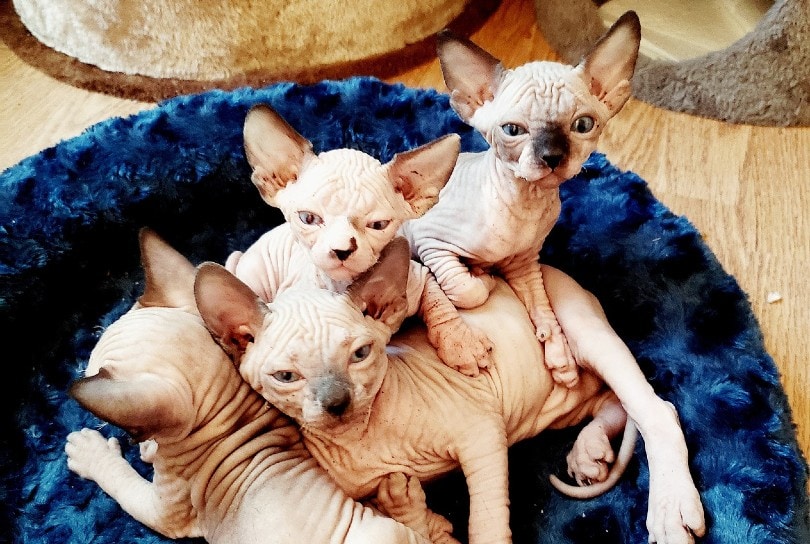
One of the most important decisions you will make concerning your Sphynx is what breeder you choose. A good breeder has the experience and knowledge to create healthier cats free from genetic defects that can cause health problems, and they can also create show quality cats that you can enter into cat shows. Good breeders will usually allow you to see behind the scenes and are much less likely to be mistreating the animals. Here are a few of our favorites to help get you started.
Sphynx Cat Breeders Near Me
The Cat Kingpin is a great resource for finding Sphynx breeders in your area. It has a large database of breeders organized by state.
Sphynx Cat Breeders That Ship Sphynx Cats
Many online breeders will ship your Sphynx right to your door, including Glorious Sphynx Kittens and My Sphynx Mate.
International Cat Registry
The International Cat Registry is the largest genetic registry of pedigreed and domesticated cats, and they have a large list of Sphynx breeders. You can find breeders from around the world and order the American ones by state.
How Much Are Sphynx Cats?
Despite their growing popularity, Sphynx cats are still quite rare, and reputable Sphynx cat breeders can charge between $1,500 and $4,500 for your kitten. Several factors will affect the price of your kitten, including the demand from a particular breeder, distance to the Sphynx cat breeders, and even time of year. Other factors that can increase the price include special color patterns, breeding rights, genetic testing, and vaccination shots.
You will need to consider other costs, including getting the cat spayed or neutered if you didn’t purchase breeding rights and any vaccination shots it will need, like rabies and distemper. Many owners also get flea and tick medication, and you will need at least one litter box. Ongoing expenses include food, litter, treats, and toys. Some owners also purchase health insurance for their pets.
The 6 Things to Ask Sphynx Cat Breeders
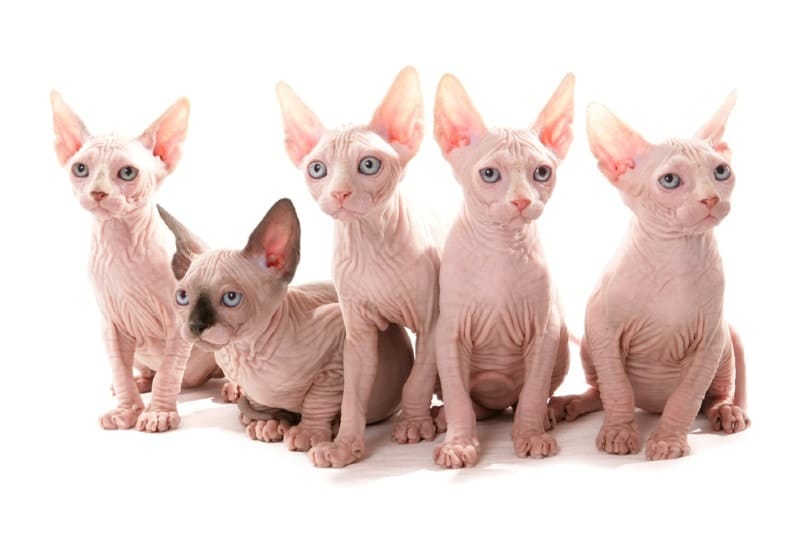
If you are purchasing your Sphinx from an online breeder, we recommend reading over the website thoroughly, paying special attention to the reviews and comments people leave. You can also send an email with any questions you have to try to get more information about your kitten. If you are utilizing a local breeder that you can visit, we recommend doing so. While visiting, you can ask several questions to learn more about the breeder and your kitten.
1. How Many Litters Does the Breeder Raise Each Year?
While several litters each year might sound impressive, it could be a sign the breeder is mistreating the cats and forcing them to become pregnant more often than they should. It’s also difficult to give the kittens the attention they need when there are too many in a small facility. We recommend looking at the kittens to see if they are well-fed, healthy, and active.
2. Is the Kitten Socialized?
Kittens allowed to stay with other kittens for their first few weeks are much more likely to get along with other cats later in life. These cats also tend to be more outgoing and friendly than cats separated from the others early on.
3. Can I Meet the Parents?
We recommend asking if you can meet your potential kitten’s parents before you make a purchase. Doing so will give you an idea of what it will look like and how big it will be. It will also give you clues as to what kind of temperament it will have. If the parents are friendly, the kitten will probably be friendly too.
4. Are the Parents Certified?
It’s possible to get the parents genetically tested to check for the potential for genetically transmitted diseases that can affect many aspects of your kitten’s health.
5. Is the Breeder a Member of a Sphynx Cat Breeders Club?
Breeders that are members of cat breeder clubs are more likely to follow breed standards because not doing so will put their membership at risk. A breeder that follows the standard will create kittens with less risk of genetically transmitted diseases and other health problems. These breeders are also more likely to provide a suitable environment for the parents and are less likely to take part in dangerous practices like overbreeding.
6. Does the Kitten Come With a Pedigree and Registration Papers?
Registration papers should come with all cats that you purchase from a breeder. It authenticates the cat’s bloodline and registers you as the cat’s owner.
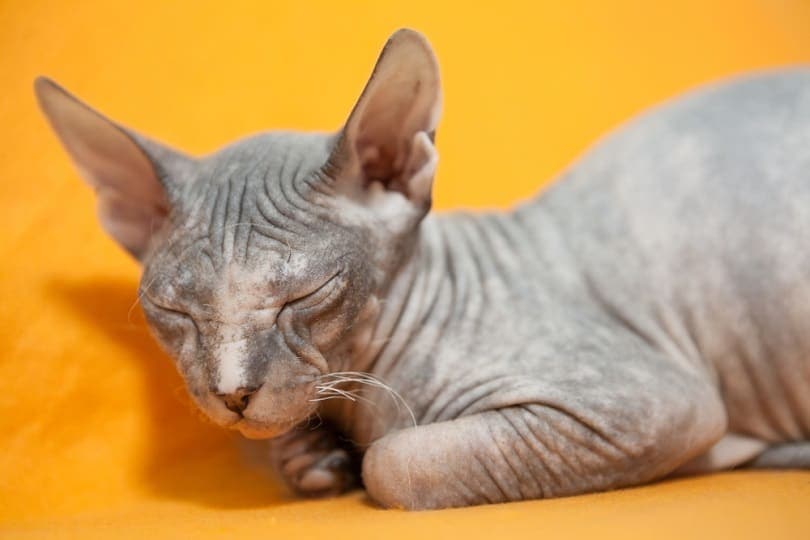
The 6 Things to Know Before Buying a Sphynx Kitten
- Sphynx cats have no hair, so they tend to get cold easily and will often seek out warmth wherever they can find it, and you will often find these cats hiding between the blankets of a made bed. However, they also tend to burn themselves on heaters, radiators, and even light bulbs.
- Providing them with a safe and warm space by using a heating pad or a screened-off heat lamp in a large aquarium, as you might for a reptile, can keep your kitten from being cold and might prevent them from getting burned on other more dangerous heat sources.
- The Sphynx is quite clingy and will want you to hold them all the time.
- The Sphynx gets sunburned really easily, so you will need to make sure no direct sunlight is getting into your home.
- These cats require more supervision than most other breeds because they continuously get burned or sit in the sunlight trying to warm up. They also tend to wander off and hide somewhere you can’t find them attempting to get warm.
- The Sphynx is one of the friendliest cat breeds and perfect for people who like to carry their cat around with them and keep them on their lap.
Conclusion
While it has an unusual and even startling appearance, the Sphynx is one of the friendliest cat breeds you can find, and it will spend as much time as possible on your lap. It’s better suited to a warmer environment, but you can find Sphynx breeders all over the United States. The price is still a little high because it’s a newer breed, and its popularity is still on the rise, but as long as it stays warm, it’s a healthy cat with a lifespan of about 14 years.
We hope you have enjoyed our look into where you can find these unique cats and found the answers you needed. If we have helped you find your next pet, please share this guide to finding Sphynx breeders in the US on Facebook and Twitter.
Related Sphynx Cat Reads:
- Peterbald vs Sphynx: What’s the Difference? (With Pictures)
- 8 Different Sphynx Cat Colors (With Pictures)
Featured Image Credit: dezy, Shutterstock
Contents
- Sphynx Breeders in the US
- How Much Are Sphynx Cats?
- The 6 Things to Ask Sphynx Cat Breeders
- 1. How Many Litters Does the Breeder Raise Each Year?
- 2. Is the Kitten Socialized?
- 3. Can I Meet the Parents?
- 4. Are the Parents Certified?
- 5. Is the Breeder a Member of a Sphynx Cat Breeders Club?
- 6. Does the Kitten Come With a Pedigree and Registration Papers?
- The 6 Things to Know Before Buying a Sphynx Kitten
- Conclusion

